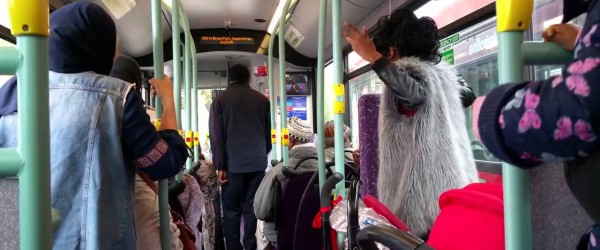A recent report in The Independent highlighted that there has been a spike in Islamophobic hate crime of more than 300 per cent since the Paris attacks. Most victims of the UK hate crimes were Muslim girls and women aged from 14 to 45 in “traditional Islamic dress.” Even before the attacks, the recent high profile video of a woman shouting abuse at two Muslims on a London bus had raised concerns regarding people’s apathy in relation to public hate attacks. This is not to say there haven’t been people intervening: one recent exception is Ashley Powys, who witnessed a young Muslim woman on the London Tube being racially abused and came to her aid. His post about the incident went viral and he has garnered a lot of support for standing up for her instead of just watching it happen.
Another exception was when Ruhi Rahman was racially abused on the Metro in Newcastle. She was travelling with her sister when a man proceeded to verbally abuse them. When talking about the incident, Rahman said, ‘Before I even got a chance to react to his comments the women beside me supported me and helped’.
Eventually, most of the other passengers on the Metro got involved and spoke up for them and Rahman described them as ‘being so supportive’. It showed a positive display of unity and Rahman has since said, it felt like they all ‘were one big family.’
Unfortunately, this isn’t always the case in such attacks. Bystander apathy is a social psychological phenomenon that refers to cases in which individuals do not offer any means of help to a victim when other people are present. Powys says, ‘the silence was deafening. I still can’t get over the silence of it all’ as the young girl was being verbally attacked in front of a carriage full of people. In theory, most people would like to think that they would get involved but remain silent. Silence in the face of these attacks indicates an implicit condoning of such incidents.
According to Dr Neil Chakraborti, director of the Leicester Centre for Hate Studies, the ‘vast majority of victims I’ve spoken to have been really sad because people have turned a blind eye and that has exacerbated their sense of isolation,’ It seems that victims do agree that the silence of others really enhances their feeling isolated and reinforces that others may condone these attacks. But with the fear of reprisal or a condoning silence, what else can we do if we witness these incidents? The Guardian has recently published an article on how to respond. It gives practical advice on staying safe. Both Chakraborti and Ismail warn: “Don’t put yourself in any danger… Can you just put your arm around somebody and ask if they’re all right…? It might sound trivial but just that act of kindness can make someone feel less alone.”
Intervention can come in the form of different actions; it does not always mean confronting the attacker. The advice also recommends that witnesses contact the police. Do not assume that someone has done so or will do on behalf of the victim. Also, using your phone to record and film the incident ‘can be key for furnishing police with the evidence they need to make an arrest or bring a charge against someone.’ There have been instances when the CCTV is not working or the images produced aren’t clear enough to provide adequate evidence. By filming it, you can contribute your support. In addition, the resulting increase in prosecutions sends a strong message that this is against the law and will not be tolerated.
Unfortunately, as Dr Neil Chakraborti has pointed out ‘Many victims don’t even recognise that they’ve been the victim of a hate crime. They normalise a lot of this behaviour, it happens so repeatedly, so often, it’s a routine part of being different.’ This highlights a disturbing trend that hate crime is so common that it isn’t viewed as anything other than the norm. Work needs to be done to change this perception and support those affected. There are charities that strive to make a difference about raising awareness of these incidents and providing specialist support to those affected. Charities such as JAN Trust specialize in supporting victims and raising awareness of hate crime. Victim Support assists victims and witnesses affected by crime. Perhaps more government support to help with advertising these charities in places where these attacks are frequent may help?
Although some have criticized Powys for going public with his intervention, I think he and the passengers on the Newcastle Metro, should be lauded for having stepped in where many others don’t and it gives us hope that there are people out there who are not willing to stand by while this kind of abuse is happening. By supporting each other, Rahman commented that; ‘We came as one unity, stood up against what is wrong’. Unity instead of division should be what we strive for, especially in response to world terror attacks.


3 Comments
Masha Allah You brought a nice Point-” Support Each other “.
Thank you for your comment, Aafia. Wouldn’t it be great if supporting each other was more the norm than staying silent! InshaAllah this is something we can all try to work towards.
[…] the full article via Muslimah Media […]